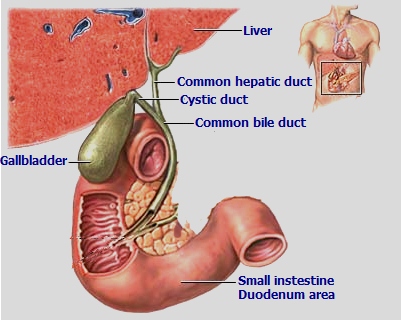 Watch The Television Interview with JaineKirtley About Gallstones Click Here
Watch The Television Interview with JaineKirtley About Gallstones Click Here
Stop Gallstones Naturally
Pain from gallstones can be excruciating; many people describe the pain as being as bad as labour pains (even men!). Gall stones form in a poorly functioning gall bladder. The gall bladder stores bilewhich helps us to digest fats. If the bile has the wrong balance of cholesterol, bile salts, and bilirubin the gall stones can form.
There are two types of gall stones; hard and soft. An ultra sound examination is used to confirm the presence of gall stones. Intense pain can occur if the gall stones put pressure in the bile duct whichis the tube the bile leaves the gall bladder. But much of the time people are unaware that they have gall stones; the gall stones can increase in size and number before matters become urgent.
So how can you stop gall stones from forming? And what can you do once you have them? Research shows that your diet can play a big part. Alcohol, sugars and poor quality fats all increase your risk of getting gall stones[ 1-4]. They way you eat seems important too, people who generally have bigger sized meals and less small snacks are more likely to be affected[ 4]. On the list of foods more likely to prevent gall stones are fish, fruits, [ 4], vegetables[ 3, 5], polyunsaturated and monounsaturated fats [ 6](high in fish, cold pressed flaxseed oil, avocado oil and extra virgin olive oil), oats[ 7] and nuts[ 8, 9]. The nutrients that have been found to decrease the occurrence of gall stones are vitamin C [ 4, 10], folic acid, magnesium and calcium[ 4]. If I do usesupplements I recommend the Entire Katoa Food State supplements for the optimum absorption and bioavailability. People who are obese are more likely to have gall stones, so focus not only on improving your diet to lose weight but also exercising. People who walk more often rather than sit have less chance ofgall bladder problems[ 4] There are many herbs which help the gallbladder to work more efficiently these include Yellow Dock, Artichoke, Dandelion, Mountain Grape, Wild Yam, Milkthistle and Balmony[ 11]. Other herbs may be used in addition if the gall bladder is inflamed, to help disperse wind, and to help liquefy the gall stones. Do seek advice before using any herbal medicine. Howeverit is safe to drink a cup of Dandelion tea a day to help support you liver and gallbladder[ 11]. A really excellent naturopathic treatment which gets rid of gall stones is a Liver Gallbladder Flush. I have used this with many clients and it has resulted in the passing of gallstones which meant thatthey no longer needed surgery. It is an involved procedure and beyond the scope of this column. I recommend you only do this with guidance from a naturopath. If you have very large gall stones the Flush may not be suitable for you. Do seek advice so that you can do the flush safely andsuccessfully. References 1. Cuevas A, Miquel JF, Reyes MS, Zanlungo S, Nervi F: Diet as a Risk Factor forCholesterol Gallstone Disease. J Am Coll Nutr 2004, 23(3):187-196. http://www.jacn.org/cgi/content/abstract/23/3/187 2. Leitzmann MF, Tsai C-J, Stampfer MJ, Rimm EB, Colditz GA, Willett WC, Giovannucci EL: Alcohol consumption in relation to risk of cholecystectomy in women. Am J Clin Nutr 2003, 78(2):339-347. http://www.ajcn.org/cgi/content/abstract/78/2/339 3. Misciagna G, Centonze S, Leoci C, Guerra V, Cisternino AM, Ceo R, Trevisan M: Diet, physical activity, and gallstonesa population-based, case-control study in southern Italy. Am J Clin Nutr 1999, 69(1):120-126. http://www.ajcn.org/cgi/content/abstract/69/1/120 4. Ortega RM, Fernandez-Azuela M, Encinas-Sotillos A, Andres P, Lopez-Sobaler AM: Differences in diet and food habits between patients with gallstones and controls. J Am Coll Nutr 1997, 16(1):88-95. http://www.jacn.org/cgi/content/abstract/16/1/88 5. Tsai C, Leitzmann M, Willett W, Giovannucci E: Fruit and vegetable consumptionand risk of cholecystectomy in women. Am J Med 2006, 119:760 - 767. http://www.amjmed.com/article/S0002-9343(06)00340-8/abstract 6. Tsai C-J, Leitzmann MF, Willett WC, Giovannucci EL: The Effect of Long-TermIntake of cis Unsaturated Fats on the Risk for Gallstone Disease in Men. Annals of Internal Medicine 2004, 141(7):514-522. http://www.annals.org/content/141/7/514.abstract 7. Andersson M, Ellegard L, Andersson H: Oat bran stimulates bile acid synthesiswithin 8 h as measured by 7-hydroxy-4-cholesten-3-one. Am J Clin Nutr 2002, 76(5):1111-1116. http://www.ajcn.org/cgi/content/abstract/76/5/1111 8. Tsai C-J, Leitzmann MF, Hu FB, Willett WC, Giovannucci EL: Frequent nutconsumption and decreased risk of cholecystectomy in women. Am J Clin Nutr 2004, 80(1):76-81. http://www.ajcn.org/cgi/content/abstract/80/1/76 9. Tsai C-J, Leitzmann MF, Hu FB, Willett WC, Giovannucci EL: A ProspectiveCohort Study of Nut Consumption and the Risk of Gallstone Disease in Men. Am J Epidemiol 2004, 160(10):961-968. http://aje.oxfordjournals.org/cgi/content/abstract/160/10/961 10. Walcher T, Haenle M, Kron M, Hay B, Mason R, Walcher D, Steinbach G, Kern P, Piechotowski I, Adler G et al: Vitamin C supplement use may protect against gallstones: an observational study on a randomly selected population. BMC Gastroenterology 2009, 9(1):74. http://www.biomedcentral.com/1471-230X/9/74 11. Bartram T: Bartram's Encyclopedia of Herbal Medicine. London: Robinson Publishing;1995. 
FIND OUT MORE ABOUT...